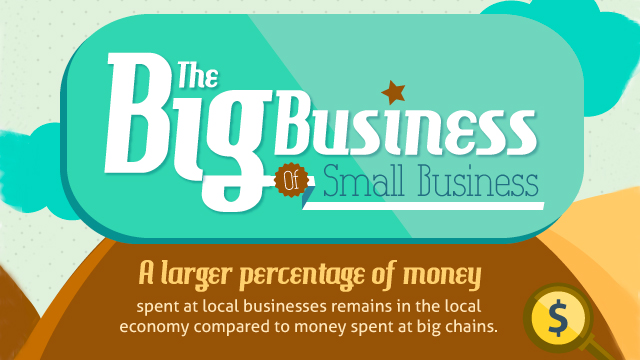
Connecting Main Street to capital is vital, and serves as a vehicle for helping the overall economy. Studies show job creation, community outreach and “green” practices all tie back to small business. As a company, we’re dedicated to helping small businesses grow. That’s why we want to start sharing helpful information and data on the state of the small business economy that not only benefits our customers, but also sheds light on how individuals can support their local small businesses.
A study in the Chicago area found that $68 of every $100 spent at an independent business stays in the local economy. Compare that to the $43 per $100 that big chain businesses spend locally, and you’ll understand just how vital small businesses are to the local economy. Studies done in Portland, Maine and Salt Lake City, Utah returned strikingly similar results.
For all its importance, small business is fighting for a place in consumers’ hearts. National market shares of locally-owned retail shopping businesses declined 11% from 1990 to 2009. For food-related businesses, they dropped from 71% to 64% in the same period.
Despite the bad news of market shares, local grocery and clothing stores are beginning to see growth in sales. And for employees, wage growth was higher in small businesses with fewer than 100 employees.
But small businesses are more than the pulse of a local economy—they’re the lifeblood of their communities. Small businesses have created 65% of all new jobs for more than a decade. They also employ a little over half of all workers in the United States. Local business success provides a national boost. Without small business, the nation’s unemployment rate would be much higher than its current 7.9%.
In addition, shopping local helps reduce your carbon footprint, as many independent businesses also shop local themselves. This means the goods you buy don’t have to travel as far, saving on transportation costs and fuel.
Boosting Small Businesses: The Shop Small Movement
Fortunately, awareness about the importance of small businesses to both the local and national economies is growing. In the last few years, a number of new campaigns and organizations launched to promote support for small businesses.
Community First Fridays are one example. All over the country, cities invite residents to spend their evenings with independent stores, food, art, and live entertainment on the first Friday of the month.
Perhaps the best-known of these campaigns is Small Business Saturday, which started in 2010 and quickly gained traction. Their aim is to draw attention to local businesses during the busy shopping period during Thanksgiving weekend. As of 2012, it has amassed tremendous awareness and support from elected officials in every state, dozens of corporate supporters, and more than three million “likes” on Facebook.
Shift Your Shopping began in fall of 2011, partnering with 38,000 businesses in 150 communities across the U.S. and Canada. The campaign encourages residents to take their local economy into their own hands by choosing independent shops over chains. It’s a year-round campaign with a strong focus on the holidays. Their site provides a map of “shop local” community initiatives around the country.
Independent We Stand is a movement similar to Small Business Saturday and Shift Your Shopping, also with a year-round focus. They offer marketing materials, economic impact calculators, and a blog with articles, studies, and links to help promote the benefits of the shop small movement.
How You Can Get Involved
It’s easy to support the shop small movement:
● Seek out small, independent businesses in your local community.
● When possible, avoid shopping at big box stores and other large chains.
● Buy produce and other products from your local farmer’s market, or directly from nearby farms.
● Shop local businesses before you shop online.
If you own a business, look for local vendors before reaching out to large, national vendors. In addition to supporting your local economy, you may even save some money.
You can also help spread the word to family and friends about supporting their local community’s small businesses as well. Some campaigns offer materials specifically for that reason, but it’s also as simple as sharing a status on your favorite social network like Facebook or Twitter.
In addition to supporting your community and saving money, you may enjoy some old-fashioned customer service by shopping local. There’s nothing like walking into a store, being greeted by name, and knowing that your business is truly appreciated.

Copy & Paste The Code Below to Share This Infographic